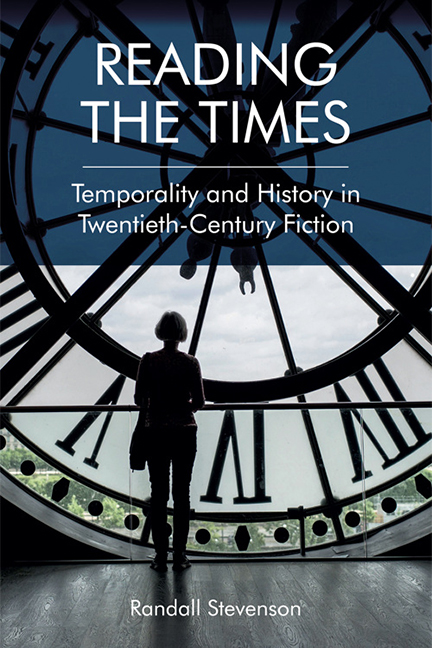Book contents
- Frontmatter
- Contents
- List of Illustrations
- Preface
- 1 Introduction: Picnic Time, Prime Time, Story Time
- 2 ‘All Those Figures’: Joseph Conrad and the Maritimes
- 3 ‘Wheels within Wheels’: D. H. Lawrence, Industrial Time and War Time
- 4 Times in the Mind: Modernism in the 1920s
- 5 Not Like Old Times: The 1930s to Mid-Century
- 6 ‘Time is Over’: Postmodern Times
- 7 Conclusion: Millennial Times, Perennial Times
- Bibliography
- Index
6 - ‘Time is Over’: Postmodern Times
Published online by Cambridge University Press: 10 November 2020
- Frontmatter
- Contents
- List of Illustrations
- Preface
- 1 Introduction: Picnic Time, Prime Time, Story Time
- 2 ‘All Those Figures’: Joseph Conrad and the Maritimes
- 3 ‘Wheels within Wheels’: D. H. Lawrence, Industrial Time and War Time
- 4 Times in the Mind: Modernism in the 1920s
- 5 Not Like Old Times: The 1930s to Mid-Century
- 6 ‘Time is Over’: Postmodern Times
- 7 Conclusion: Millennial Times, Perennial Times
- Bibliography
- Index
Summary
‘Have you not done tormenting me with your accursed time! It's abominable!’ Pozzo's exclamation – in Samuel Beckett's play Waiting for Godot (En attendant Godot, 1953) – might be considered simply to extend into the latter half of the twentieth century attitudes to ‘accursed time’ familiar from literature in its opening decades. Beckett might be supposed a natural inheritor of these attitudes, acquired through his thorough acquaintance with modernist writing at the end of the 1920s. His earliest work includes an essay published in 1929 on James Joyce, whom he knew personally as well as through his fiction; a critical study, Proust, which appeared in 1931; and ‘Whoroscope’, the winner of a prize offered the previous year for the best poem on the subject of time.
Yet Pozzos's outburst, and Waiting for Godot generally – while exhibiting some continuities with modernist writing – also reflect new and graver stresses following the Second World War. ‘When! When!’, Pozzo continues:
One day, is that not enough for you, one day like any other day … one day we were born, one day we shall die, the same day, the same second … They give birth astride of a grave, the light gleams an instant, then it's night once more.
Temporality, for Pozzo, threatens not on account of the exacting clockwork that troubled the modernists. Struggling to find his chronometer, a much-prized heirloom, he protests instead, regretfully, that ‘surely one should hear the tick-tick’, remarking ‘damnation’ when only his heartbeat proves audible (46). Temporality, in this view, is troubling not because of its mechanical measurement, but because it scarcely seems meaningfully measurable at all – existing instead only in isolated fragments; days or seconds ‘like any other’, lacking distinction, extension or mutual relation. Life continues, in Waiting for Godot, and changes do occur – the heart beats on, the tree grows leaves, Pozzo becomes blind, and Lucky dumb – but independently of conventional, coherent continuity. In a setting as empty and featureless temporally as it is topographically – stage directions specifying only ‘A country road. A tree. Evening’ – words such as ‘yesterday’ or ‘tomorrow’ almost lose their meaning (7). Not surprisingly, Vladimir suggests it may not only be Pozzo's watch that has been lost, or ceased to tick, but rather that ‘time has stopped’ in general (36).
- Type
- Chapter
- Information
- Reading the TimesTemporality and History in Twentieth-Century Fiction, pp. 160 - 219Publisher: Edinburgh University PressPrint publication year: 2017



